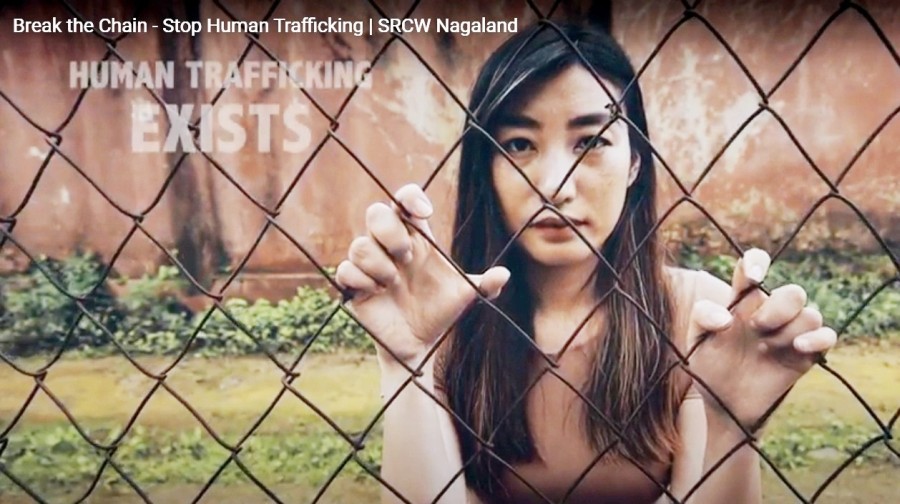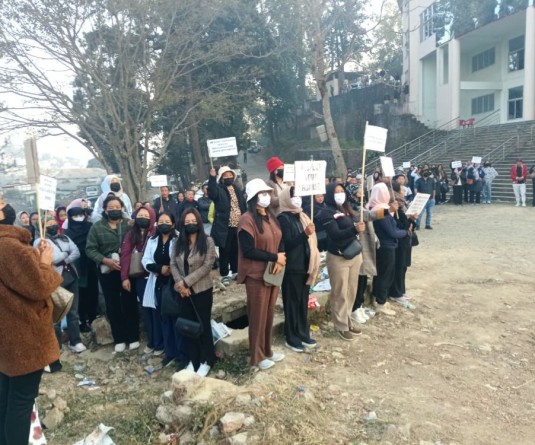A screenshot from the video titled ‘Break the Chain - Stop Human Trafficking’ by SRCW Nagaland. This video was issued in public interest on the occasion of World Day against Trafficking in Persons, July 30, 2020 by the State Resource Centre for Women Nagaland and the 181 Women Helpline Nagaland as part of its digital campaign to sensitize on the issue of Human Trafficking. (File Photo/Screenshot)

Dimapur, July 29 (MExN): Ahead of the World Day against Trafficking in Persons, the State Resource Centre for Women (SRCW) Nagaland has called for united efforts to prevent trafficking and protect victims of human trafficking.
July 30 is dedicated to raise awareness about human trafficking, and this year’s theme ‘Victims’ voices lead the way’, highlights the importance of listening to and learning from survivors of human trafficking.
In its statement on July 29, the SRCW Nagaland stated that if more victims are able to tell their stories with as much people believing in them, it would bring about a positive change.
“The testimony of the victims will hopefully bring about a new and positive light on the ever increasing terror that preys upon the mighty human race,” it said.
‘Muffled voices’
The SRCW highlighted that while human trafficking is not news anymore, the society has conditioned people to believe it to be a ‘normal phenomenon’. But the victim count in the world runs in millions, it noted. Of the millions of victims, hundreds of thousands try and tell their stories, of which a few are believed, it said.
In a lot of cases, victims are coerced into lying or to withdraw their complaints, the SCRW stated and reminded that, “A retracted report doesn’t mean it did not happen.”
Even in the Northeast states, women and children are marginalized countless of times, it added. “It has been ingrained in their minds to accept the fate and live in fear and subjugation,” the SRCW stated.
Citing cases involving victims from Dimapur who were rescued and brought back and reunited with their families, the SRCW noted that in a lot of cases, the perpetrators are mostly people the survivors already knew as friends, family and neighbors.
According to data received from the Nagaland Police, for the last five and a half years from 2015-2021, six cases have been registered under its Anti-Human Trafficking Unit (AHTU), where 28 persons were rescued, out of which 26 were females and 2 were males.
Dimapur had the highest number of rescued victims (22), followed by Wokha (6).
Of the total number of persons arrested in these cases, 10 were from Dimapur, 8 from Wokha and 1 from Phek, the SRCW informed.
Speak up
On the occasion of World Day against Trafficking in Persons, the SRCW encouraged survivors to not give up and to allow themselves to ask for help, reminding them that, “that there are people who will believe, protect and defend the survivors and their stories.”
It shared that victims are slowly overcoming their pain and fears and coming forward to narrate their ‘unfiltered’ stories, and expressed hope that one day, the world will have to sit and listen to each one of them. “…there will definitely be positive change with education and awareness, research and strength and finding the right people to trust,” it added.
Towards this end, the SRCW highlighted various laws under the Indian Constitution that address and penalize human traffickers. Some of the laws include the Immoral Traffic (Prevention) Act, 1956, Child Labour Act, 1986 and Juvenile Justice Act, 2016, Indian Penal Code (IPC), Protection of Children from Sexual Offences (POCSO) Act, 2012 etc.
It also informed that there are multiple schemes under the Ministry of Women & Child Development, Government of India that aims to provide services to women in distress, some of which are: Ujjawala Scheme for prevention of trafficking and rescue, rehabilitation and reintegration of victims of trafficked women and children. The Swadhar Greh scheme also seeks to address the needs of females in difficult circumstances, including victims of sex trafficking, it added.
Besides these schemes, the Women Helpline-181 provides 24 hour toll free telecom service to women affected by violence and seeking support and information. Sakhi- One Stop Centres (OSCs) provide integrated support and assistance for women affected by violence under one roof with services like medical assistance, police assistance, psycho social support, legal aid, shelter, video conferencing. OSCs are set up in 11 districts in the State, the SRCW informed.
If you or someone you know is being forced to engage in any activity like commercial sex, household work, farm or construction work, retail factory, manual labour or any other activity, contact the Anti-Human Trafficking Units (AHTU) which are set up in all the districts by the Police under the Home Department, the SRCW informed.
Women and girls in distress can also dial the Women Helpline (181 or 9485239098) for help in any crisis or visit Sakhi-One Stop Centres (OSCs) in their respective districts.
Further, the SRCW Nagaland and 181- Women Helpline (WHL) under the Department of Social Welfare, in collaboration with Sakhi- One Stop Centre (OSC) have come up with Information, Education and Communication (IEC) materials translated into 19 local languages with the aim to strengthen the grassroots awareness programmes and to prevent cases of trafficking.
It urged citizens to utilize the services available to prevent trafficking and protect victims and also to follow official pages on Facebook, Twitter, Instagram and YouTube channel of the SRCW Nagaland and 181 Women Helpline Nagaland for more information.






